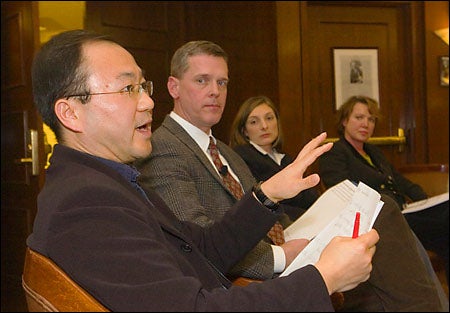Shorenstein Fellows discuss international media topics at KSG

After a semester studying everything from the press in China to the culture wars in the United States, five research fellows from the Shorenstein Center on the Press, Politics and Public Policy shared their findings during a discussion Monday afternoon (Dec. 12) at the Kennedy School of Government.Zhengrong Hu, a professor at the Communication University of China, focused his research on the Chinese press and the factors that might influence future government policy relating to the media. It is uncertain and difficult to forecast, Hu said, adding that press freedoms in China are often “two steps forward, one step back.” Hu described how the government attempts to manage the media by sending out directives regarding content. But, he said, events such as the SARS epidemic and the recent toxic river spill, and the extensive press coverage both stories received throughout the country, demonstrate how impossible it is to control all of the news.David Anable, a former managing editor of the Christian Science Monitor, studied recent revolutions in Serbia, Georgia, and Ukraine to learn if the media can play a constructive role in building democracy. “The answer came through loud and clear,” Anable said. “The answer is yes. Journalists and good media can really help make democracy work. Those three revolutions went ahead partly charged and informed by the media, and it helped get people on the streets to make the changes.”However, Anable did share bad news regarding the press in the region. “In Georgia, for instance, what used to be the critical watchdog media that helped get this new government in power has become the mouthpiece of the new government,” he said. “They cannot make the switch to being the opposition again.”Sunshine Hillygus, an assistant professor of government at Harvard, researched the voting statistics from the 2004 U.S. presidential election to try to understand why the so-called culture wars received so much attention from the media and the political parties.”The election was really not about gay marriage and abortion,” Hillygus said. “It was not a referendum on these moral issues. Rather it was Iraq, terrorism, and the economy that was foremost on the minds of the voters. “Why is it then that the political parties are increasingly polarized on these cultural issues while the mass public is not?” she asked. “The argument I make is it is because in large part the parties are narrowly targeting their campaign messages to very small issue publics. They think it is important to micro-target their message to people who are concerned about gay marriage and abortion and they ignore the rest of the electorate.”Diane Francis, a columnist for the National Post in Canada, investigated the factors behind Canada’s decision not to join the Iraq coalition. Francis interviewed many of the players behind the scenes and was shocked at what she discovered. “It had nothing to do with principles,” and more to do with a “shocking display of pettiness” on the part of the U.S. president and the Canadian prime minister, Francis said. “They were backbiting, and name-calling, and snubbing. It was a pretty embarrassing display of adolescence on the part of both leaders. The power of this personality conflict overrode polling and overrode press endorsements.”Brig. Gen. Kevin Ryan (ret.) examined how manpower issues strain the U.S. military, and how this issue can be understood by the American public through the press.The discussion was moderated by Thomas Patterson, Bradlee Professor of Government and the Press at the Kennedy School.




